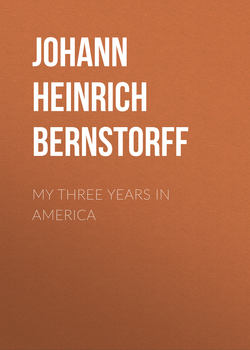My Three Years in America

Реклама. ООО «ЛитРес», ИНН: 7719571260.
Оглавление
Johann Heinrich Andreas Hermann Albrecht Graf von Bernstorff. My Three Years in America
INTRODUCTION. MY FUNDAMENTAL POLITICAL VIEWS BEFORE AND DURING THE WAR
CHAPTER I. GERMANY AND THE UNITED STATES BEFORE THE WAR
CHAPTER II. THE GERMAN PROPAGANDA IN THE UNITED STATES
CHAPTER III. POLITICAL EVENTS PRECEDING THE "LUSITANIA" INCIDENT
CHAPTER IV. ECONOMIC QUESTIONS
CHAPTER V. THE SO-CALLED GERMAN CONSPIRACIES
CHAPTER VI. THE "LUSITANIA" INCIDENT
CHAPTER VII. THE "ARABIC" INCIDENT
CHAPTER VIII. THE SECOND "LUSITANIA" CRISIS
CHAPTER IX. THE "SUSSEX" INCIDENT
CHAPTER X. AMERICAN MEDIATION
CHAPTER XI. THE RUPTURE OF DIPLOMATIC RELATIONS
CHAPTER XII. THE RETURN HOME
Отрывок из книги
Anyone who has lived some time in the United States will feel with Goethe that "America is better off than our own Continent." Owing to the almost perfect autarchy existing there, grave economic problems never really arise. Nowhere else, during the whole course of my various diplomatic wanderings, have I ever seen a happier people, who looked more cheerfully into the future. In view of the comparatively sparse population of the country, intensive agricultural production has only become necessary in a few isolated districts; there are always purchasers in plenty for the rich surplus of raw materials available, and industry has not yet been directed solely towards export. As a result of these happy conditions, the American citizen feels but little interest for what goes on in other countries. In the period preceding the Five-Years War, if the political interests of the United States ever happened to cross those of Europe, it was almost exclusively in regard to American questions. As a proof of this we have only to think of the Spanish-American War, and of the various incidents relating to Venezuela; whereas it was only with difficulty that the German Government succeeded in inducing President Roosevelt's Administration to take part in the Algeciras Conference, at which the presence of the United States representative in no way alleviated our task.
Up to the time of the Five-Years War, the Foreign Policy conducted from Washington was almost entirely Pan-American, and the Monroe Doctrine was the beginning and end of it; for even if that versatile man, President Roosevelt, was fond of extending his activities to other spheres, as, for instance, when he brought the Russo-Japanese War to an end by the Peace of Portsmouth, the Panama Canal scheme remained his favorite child. But in the case of the Russo-Japanese War, it was home politics, which in America are chiefly responsible for turning the scales in regard to Foreign Policy, that again played the principal part. Mr. Roosevelt wished to win over to his side the very strong pacifist element in America; whereas the Imperialists – particularly later on – deprecated these successful attempts at mediation, because they prevented a further weakening of both of the belligerent parties. Even Roosevelt's Secretary of State, John Hay, concerned himself actively with the Far East, and was known in America as the spiritual founder of the policy of the "Open Door." In this particular matter, the German Government frequently acted hand in hand with the American, and it was owing to this circumstance that the Foreign Office at Berlin very much wished to have the United States represented at the Algeciras Conference. The German Government believed that the Americans would also declare themselves in favor of the "Open Door" even in Morocco. This assumption, however, turned out to be a false one, owing to the fact that the political and economic interest shown by the United States for countries on the other side of the Atlantic Ocean was not sufficiently keen. The Algeciras Conference was a fairly trustworthy forecast of all that subsequently happened at the Peace Conference at Versailles. Equally lacking in foundation was also the assumption, so prevalent in Germany, that, as the result of their energetic Far-Eastern policy, the Americans would plunge themselves into a serious conflict with Japan.
.....
The diplomatic corps in Washington thus found itself confronted by an entirely new situation. The Republican Party had been at the helm for sixteen years, and had now to vacate every one of the administrative posts. Even our personal intercourse with the President was governed by different formalities from those which existed in the days of his predecessors. Mr. Roosevelt liked to maintain friendly relations with those diplomats whose company pleased him. He disregarded the old traditional etiquette, according to which the President was not allowed to visit the Ambassadors or any private houses in Washington. The friendly relations that existed between Mr. Roosevelt and Baron Speck von Sternburg are well known. When in the year 1908, after this gentleman's decease, I assumed his post at Washington, Mr. Roosevelt invited me to the White House on the evening after my first audience, to a private interview, in which every topic of the day was discussed. Invitations of this kind were of frequent occurrence during the last two months of Roosevelt's administration, which, at the time of my entering office, was already drawing to its close. For instance, Mr. Roosevelt showed me the draft of the speech which after his retirement he delivered at the University of Berlin.
My dealings with President Taft were on the same footing; for he also was in favor of an amicable and unconventional relationship. On one occasion he invited me to join him in his private Pullman on a journey to his home in Cincinnati, where we attended the musical festival together. On another occasion, he suddenly appeared, without formal notice, at the Embassy, while we were holding a ball in honor of his daughter, and later on he accepted an invitation to my daughter's wedding.
.....